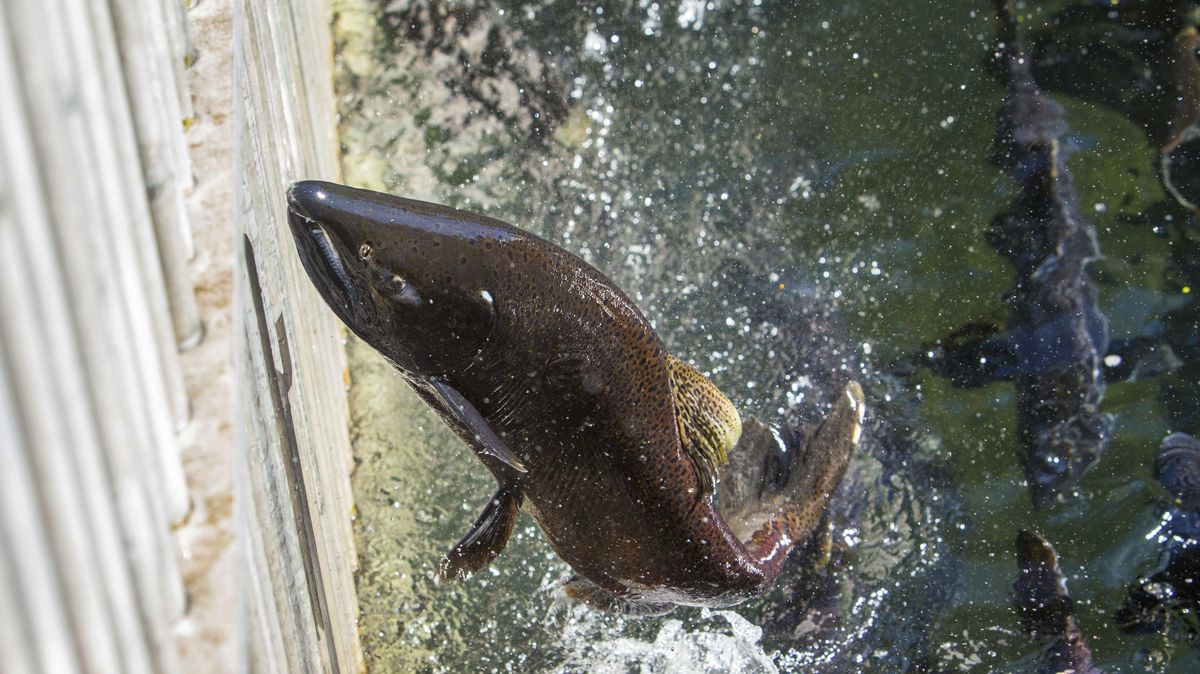House votes to curb salmon eaters: Bill would allow problem sea lions to be euthanized; Senate still must act

A bill to expand the authority of Northwest fisheries agencies to help struggling native species in the lower Columbia and Willamette rivers by killing sea lions there passed the U.S. House on Tuesday.
The legislation, co-sponsored by Jamie Herrera Beutler, R-Wash., and Kurt Schrader, D-Ore., was approved by a 288-116 vote following years of inaction.
“For the salmon and steelhead fighting to make it upstream, today’s vote in the U.S. House significantly improves their chances of survival,” Herrera Beutler said.
“We are not anti-sea lion. We’re just for protecting a Pacific Northwest treasure: salmon, steelhead, sturgeon and other native fish species iconic to our region,” she said in a news release.
Schrader said salmon are central to the culture, identity and economy of the region.
“It is one of the reasons why we’ve, as a region, put so much time, energy and resources into protecting and recovering these iconic fish.”
A companion bill in the Senate has been co-sponsored by Republican Jim Risch of Idaho and Democrat Maria Cantwell of Washington. It has yet to receive a hearing.
Both bills – dubbed the Endangered Salmon and Fisheries Predation Prevention Act – would make it easier for fisheries managers to lethally remove sea lions that are feeding on salmon, steelhead and other fish, particularly at impediments such as Bonneville Dam on the Columbia River and Willamette Falls on the Willamette River. Scientists have documented that sea lions eat an average of about 20 percent of the spring chinook run in the lower Columbia each year. That figure has climbed as high as 43 percent and dropped as low as 11 percent in individual years. They say combined with other threats like dams and habitat degradation, the predation further imperils fish protected by the Endangered Species Act, including salmon and steelhead that return to Idaho and eastern Washington.
On the Willamette River, fisheries managers say sea lion predation on winter steelhead may drive that run to extinction.
The states already have the ability to kill some sea lions on the lower Columbia, and Oregon is seeking the same authority for the Willamette River.
There are an estimated 250,000 to 270,000 California sea lions and 71,500 Steller sea lions up and down the West Coast of the U.S. and Canada. Only a small percentage of those visit the Columbia River, and even fewer venture far upstream.
The bills in both chambers give Columbia River American Indian tribes, including the Nez Perce, the same authority the states of Idaho, Washington and Oregon have to obtain permits for killing sea lions. They also slash the bureaucratic process fisheries managers must negotiate to kill sea lions, which are sheltered by the Marine Mammal Protection Act.
Current law allows the states to seek permits to kill individual sea lions that have been documented to prey on salmon and steelhead once hazing has failed to stop the behavior. The legislation removes the requirement that agencies identify individual animals as problems and instead allows any sea lion east of the Interstate 205 bridge near Portland to be captured and euthanized. It also expands the number of sea lions that can be killed from about 100 per year to about 1,000 per year.
The effort has broad support in the region. For example, the Columbia River Inter-Tribal Fish Commission and the Public Power Council – a nonprofit organization that represents about 100 consumer-owned utilities that rely on hydropower – sent a joint letter of support to members of the House and Senate leadership. The bills also received support from the states.
“The passage of H.R. 2083 is a demonstration of the unity and resolve the Northwest delegation consistently shows around salmon protection,” said Charles Hudson, intergovernmental affairs director for the Columbia River Inter-Tribal Fish Commission.
Shaun Clements, senior policy advisor for the Oregon Department of Fish and Wildlife, said the bill provides agencies like his with flexibility to address sea lion predation.
“For the past decade we’ve watched sea lion predation on some of Oregon’s iconic fish runs increase dramatically. Even as we have attempted to address all the other things affecting salmon, we have not been able to manage sea lions.”
Animal rights organizations like the Human Society of the United States and the Animal Welfare Institute have lobbied against the legislation. They cite polling that shows more than 8 in 10 Americans support the Marine Mammal Protection Act.
Republicans Raul Labrador and Mike Simpson of Idaho and all members representing Oregon and Washington in the House voted for the bill.